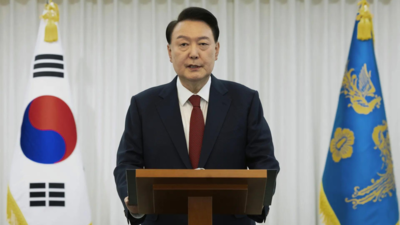Impeached South Korean President Yoon Suk Yeol has entered a tense standoff with authorities as he resists arrest over his controversial martial law decree issued on December 3. The decree, which lasted mere hours before being reversed amid widespread protests, led to his impeachment by the National Assembly on December 14.
In a defiant statement to his supporters gathered outside his residence in Seoul, Yoon vowed to “fight to the end” against what he called “anti-state forces” threatening the nation’s sovereignty. Yoon alleged that internal and external threats were putting South Korea in danger, reiterating his claims that the opposition was aligned with communist enemies.
Hundreds of Yoon’s supporters have been rallying near his residence, waving South Korean and American flags, in an effort to shield him from law enforcement. Police have maintained a heavy presence, but clashes remain a possibility as authorities weigh their next steps.
Arrest warrant and legal challenges
The Corruption Investigation Office for High-Ranking Officials (CIO), tasked with executing the arrest warrant issued by a Seoul court on Tuesday, has until January 6 to detain Yoon. Prosecutors and police have faced resistance from Yoon’s security detail, who cite laws requiring consent to access locations involving military secrets.
Yoon’s legal team has filed for an injunction to invalidate the warrant, claiming it is unlawful and that the CIO lacks authority to investigate rebellion charges. Despite the warrant, experts speculate authorities may avoid confrontation and issue another summons if they fail to act before the deadline.
The December 3 decree marked a dramatic escalation in South Korea’s political landscape. Troops briefly mobilised under Yoon’s orders to suppress alleged “anti-state elements.” The move was swiftly reversed amid national outcry, but the repercussions have been profound. Yoon faces charges of rebellion, which could result in life imprisonment or the death penalty if convicted.
Political turmoil
Yoon’s impeachment has thrown South Korea into turmoil, with the Constitutional Court deliberating whether to uphold the decision and formally remove him from office. Meanwhile, Prime Minister Han Duck-soo, who assumed acting presidential duties after Yoon’s suspension, was also impeached last week for failing to fill vacancies in the Constitutional Court.
Finance minister Choi Sang-mok, the new interim leader, has since appointed two justices, potentially influencing the court’s decision on Yoon’s impeachment. However, this move has drawn criticism from Yoon’s supporters, who accuse Choi of overstepping his authority.




